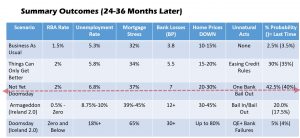The Mortgage & Finance Association of Australia (MFAA) has responded to the comments made by Commonwealth Bank of Australia (CBA) CEO Matt Comyn during yesterday’s Royal Commission hearings.
During the hearing, Comyn expressed his preference to scrap broker commissions and implement a fee for service. The MFAA has said it clearly demonstrates that CBA’s priority is shareholder returns.
MFAA CEO Mike Felton said the CBA’s position was not surprising, but was “entirely selfserving”, in that it is designed to destroy competition and reduce the bank’s reliance on the broker channel.
He said, “CBA’s model is anti-competitive and designed to drive consumers back into their branch network, which is the largest branch network of the major lenders.
“Mr Comyn’s solution for better customer outcomes is a new fee of several thousand dollars to be paid by consumers to CBA for the privilege of becoming a CBA customer.
“Cutting what brokers earn by two-thirds would save CBA $197 million, which is good for CBA’s shareholders. However, it would destroy competition, leaving millions of customers without access to credit outside of major lenders.
“In addition, as has been highlighted by both the Productivity Commission and Treasury, consumers are simply not willing to pay significant up-front fees for access to a home loan.”
Felton has also addressed Comyn’s recommendation to follow a model adopted in the Netherlands, under which consumers pay the same fee whether they use a broker or a branch, to ensure channel parity.
He said, “The proposal to adopt the Netherlands strategy is designed to maximise lender revenue. Under this model, broker customers pay the broker’s costs – instead of the bank – or branch customers pay a new fee that will substantially add to the bank’s revenue line and add thousands of dollars to the cost of getting a home loan from a lender directly.
“This is a fantastic win-win for CBA but a massive lose-lose for consumers regardless of whether or not they use a mortgage broker. CBA either acquires a new customer with zero acquisition cost, or it receives a new fee and massively decreased competition, so it can return to the days of four lenders in Australia. It’s a great deal for the bank.
“Any suggestion that this profit will be passed back to customers in the form of lower interest rates is fanciful.”
Felton also questioned the idea that brokers should earn the same as an in-house branch lender, whose overheads are paid by the bank.
He said, “Brokers are small business owners. They are not employees offering one product to customers. They pay rent, and staff, and electricity bills. They have to find every dollar they earn through servicing customers well and developing a strong reputation and referral network.”
The MFAA challenged the statements by CBA that brokers are causing systemic issues in the home lending market – and that it should be a lender who is tasked with ensuring good consumer outcomes for the entire Australian home lending market.
He said, “ASIC’s extensive, data-driven review of mortgage broker remuneration concluded that there was no finding of systemic harm caused by the broker channel,” Mr Felton said. “Additionally, as noted by Treasury in its background paper to the Royal Commission in July 2018: ‘Following a comprehensive report by ASIC in 2017 on mortgage broker remuneration, the industry is progressing reforms that could address the most significant misconduct with the current remuneration model’.”
“Frankly, we were surprised that it is being suggested that one of the major lenders should be tasked with reforming Australia’s home lending market, given the revelations of the past 12 months.
“The Productivity Commission found that: ‘Fixed fees paid by customers rather than commission structures have been proposed, and would eliminate conflicts, but the cost to competition would be high. Consumers would desert brokers, and smaller lenders (and regional communities with few or no bank branches) would suffer much more than larger lenders, if customers were required to pay for broker advice’.”



